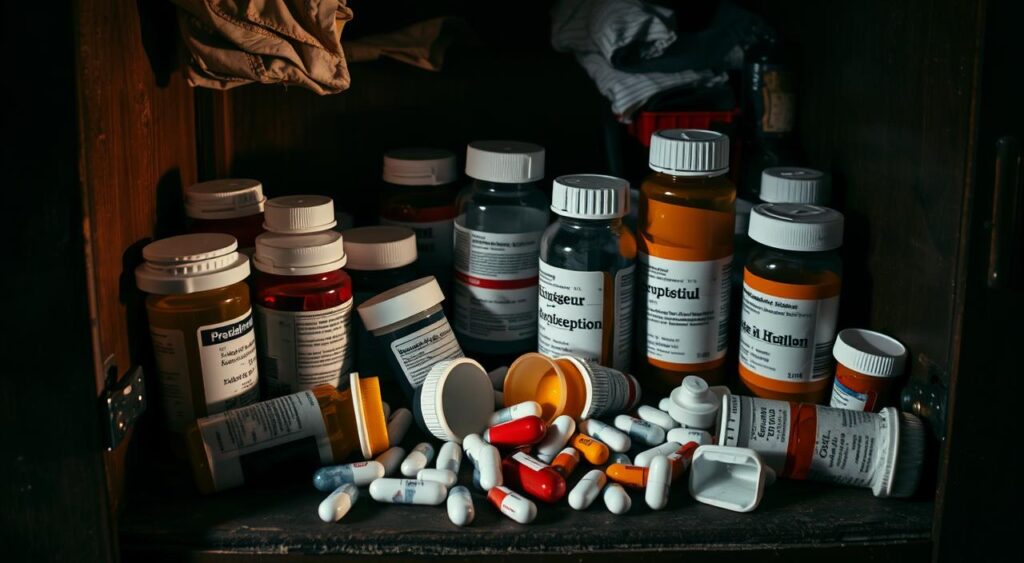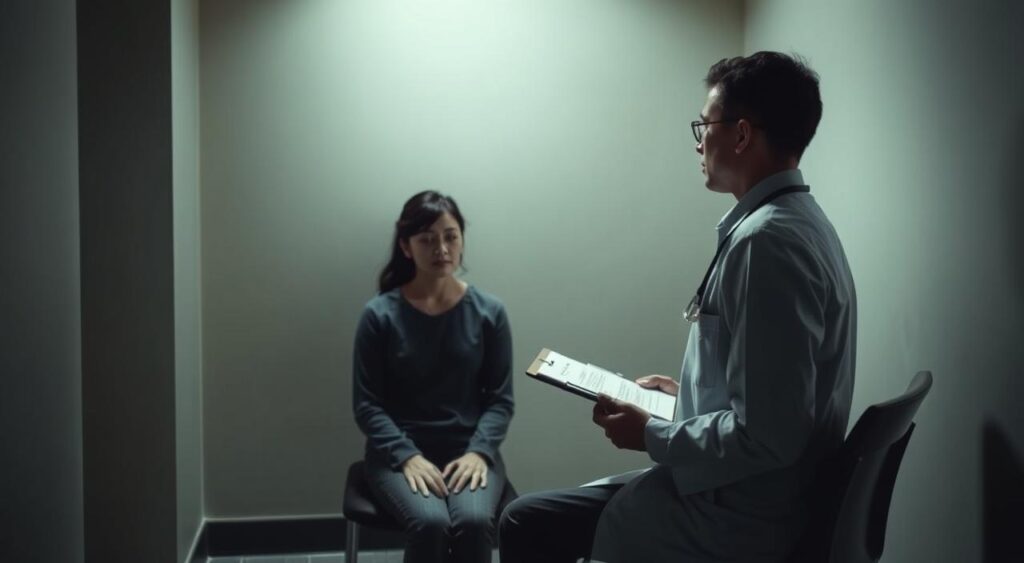Delve into the world of kleptomania – understanding the impulse to steal, its impact, and how to overcome it.
About 0.3% to 0.6% of people have kleptomania, a disorder where they steal compulsively. This can cause a lot of distress and harm. It’s important to know how kleptomania affects daily life.
Kleptomania makes it hard to resist the urge to steal, even when it leads to big problems.

It’s key to understand kleptomania for those who have it and their families. Knowing the signs helps in finding the right help for compulsive stealing. Recognizing symptoms is the first step to recovery and taking back control.
Key Takeaways
- Kleptomania is a psychiatric disorder characterized by compulsive stealing.
- Kleptomania symptoms can have a significant impact on an individual’s daily life.
- Understanding kleptomania is essential for seeking the right treatment and support.
- Kleptomania is marked by a recurring failure to resist urges to steal.
- Recognizing the signs and symptoms of kleptomania is crucial for recovery.
- Kleptomania treatment options are available to help individuals manage their symptoms.
Understanding Kleptomania: A Complex Impulse Control Disorder
Kleptomania is a puzzling disorder that has long fascinated experts. It’s marked by a strong urge to steal, even when there’s no need for it. People with kleptomania often take items that are worthless or have little value.
The kleptomania causes are still a mystery, but it’s thought to involve genetics, environment, and psychology. Treating kleptomania requires a team effort, including therapy, medicine, and support groups.
Definition and Classification
Kleptomania falls under impulse control disorders. These are conditions where people struggle to control their emotions and actions. It’s different from other issues like obsessive-compulsive disorder or substance abuse, even though they share some traits.
Difference Between Kleptomania and Common Theft
The main difference between kleptomania and regular theft is the reason behind it. People with kleptomania steal for no clear reason, unlike common thieves who do it for money or to get something they want.
Impact on Daily Life
Kleptomania can really disrupt someone’s life, causing emotional pain and problems with friends and family. Getting help and finding ways to cope is crucial.
| Characteristics | Kleptomania | Common Theft |
|---|---|---|
| Motivation | Irresistible urge to steal | Financial or material gain |
| Behavior | Recurring and compulsive stealing | Isolated incidents of theft |
| Consequences | Emotional and psychological distress | Legal and social consequences |
The History and Evolution of Kleptomania Research
Kleptomania has been seen as a unique condition for over a century. Research has been ongoing to understand its causes and find effective treatments. At first, kleptomania help was scarce, and the condition was often not well understood. But as research grew, kleptomania therapy options became more available, helping those in need.
Some key milestones in kleptomania research include:
- Early recognition of kleptomania as a distinct condition
- Development of diagnostic criteria and assessment tools
- Emergence of various kleptomania therapy options, including cognitive-behavioral therapy and medication management
Today, those seeking kleptomania help have many resources and support systems. By keeping up with research, we can find better treatments and improve lives of those with kleptomania.
As research keeps evolving, staying updated on kleptomania therapy and treatments is crucial. This way, we can offer the best support to those with kleptomania. Our goal is to make effective kleptomania help available to everyone who needs it.
| Year | Milestone | Description |
|---|---|---|
| 1900s | Early recognition | Kleptomania was first recognized as a distinct condition |
| 1950s | Diagnostic criteria | Diagnostic criteria and assessment tools were developed |
| 2000s | Emergence of therapy options | Various therapy options, including cognitive-behavioral therapy, emerged |
Recognizing the Signs and Symptoms of Kleptomania
Kleptomania is a complex disorder where people feel a strong urge to steal, even if the items are worthless. This urge can cause a lot of distress and affect their daily life. It’s important to recognize the signs early and get help from a kleptomania psychiatrist.
People with kleptomania often steal without thinking about the value of what they take. They might feel guilty, ashamed, or anxious after stealing. They might also show physical signs like tremors or sweating when they can’t steal or are caught.
Behavioral Indicators
- Recurring urge to steal, even when the items stolen are of little value
- Failure to resist the urge to steal, despite negative consequences
- Stealing items without regard for their value or need
Emotional Symptoms
- Feelings of guilt, shame, or anxiety after stealing
- Difficulty controlling emotions, leading to impulsive behavior
- Increased stress or anxiety when unable to steal
Getting help from a kleptomania psychiatrist is key for those struggling with kleptomania. With the right support and treatment, people can manage their symptoms and find better ways to cope.
Risk Factors and Triggers
People with a family history of kleptomania or impulse control disorders are more likely to get kleptomania. Stress or trauma can also start kleptomania. Understanding these risk factors is key to preventing and managing it. Also, kleptomania medication can help manage symptoms.
Some common risk factors and triggers include:
- Genetic predisposition
- Environmental factors, such as stress or trauma
- Other impulse control disorders, such as compulsive shopping or eating
It’s important to know these risk factors and triggers for effective treatment and support.

| Risk Factor | Description |
|---|---|
| Genetic predisposition | Family history of kleptomania or other impulse control disorders |
| Environmental factors | Stress, trauma, or other environmental triggers |
| Other impulse control disorders | Compulsive shopping, eating, or other impulse control disorders |
The Neuroscience Behind Kleptomania
Research shows that compulsive stealing, or kleptomania, might be linked to brain issues. These issues affect how we control impulses and process rewards. This condition leads to repeated stealing, causing emotional and social problems.
Studies found that people with kleptomania have different brain chemistry and structure. This is especially true in areas like the prefrontal cortex and amygdala. These differences can lead to uncontrollable stealing.
Genetics and environment also play a part in kleptomania. For instance, those with a family history of impulse control disorders might be more prone to stealing. Stress and trauma can also trigger kleptomania episodes.
Understanding kleptomania’s neuroscience is key to finding treatments. By knowing how brain chemistry, genetics, and environment interact, doctors can help. They can offer tailored support to those struggling with compulsive stealing.
Diagnosis Process and Criteria
To diagnose kleptomania, a detailed psychiatric evaluation is needed. This evaluation checks for specific criteria, like a constant urge to steal. It’s key to spot kleptomania symptoms and create a good kleptomania treatment plan.
Psychiatrists and healthcare experts look at the person’s behavior, feelings, and physical health. They check if the person meets the kleptomania criteria. This might include:
- Looking at the person’s medical and psychological history
- Checking their behavior and emotional state
- Seeing if they have other mental health issues
Getting a correct diagnosis is vital for a good kleptomania treatment plan. This plan might include therapy, medicine, or both. Knowing the kleptomania symptoms and criteria helps people get the help they need. This can greatly improve their life.

Only a trained healthcare professional can give a proper diagnosis and a fitting kleptomania treatment plan. If you or someone you know has kleptomania symptoms, getting professional help is crucial.
| Diagnostic Criteria | Description |
|---|---|
| Recurring inability to resist urges to steal | The person keeps feeling the need to steal, even when they know it’s wrong. |
| Failure to resist urges to steal | They can’t stop themselves from stealing, even when they try. |
| Stealing is not better explained by another mental health condition | The stealing isn’t a sign of another mental health issue, like bipolar disorder or antisocial personality disorder. |
Treatment Options and Approaches
Kleptomania therapy is key to managing the condition. It often combines psychotherapy and medication. The goal is to help people understand their actions and control impulses.
Cognitive-behavioral therapy is a helpful approach. It helps change negative thoughts and behaviors. This therapy is effective in managing kleptomania.
Medication is also important in treatment. It helps reduce anxiety and depression symptoms. These feelings often come with kleptomania.
Support groups and family therapy are also valuable. They offer a sense of community. They help individuals deal with the emotional and social challenges of kleptomania.
- Improved impulse control
- Increased self-awareness
- Enhanced coping skills
- Better relationships with family and friends
Seeking kleptomania therapy and support is crucial. It helps manage symptoms and improve life quality. Finding a treatment plan that meets individual needs is essential.
| Treatment Approach | Benefits |
|---|---|
| Cognitive-behavioral therapy | Improved impulse control, increased self-awareness |
| Medication management | Reduced symptoms of anxiety and depression |
| Alternative therapies | Enhanced coping skills, better relationships |
Living with Kleptomania: Coping Strategies
People with kleptomania can find ways to manage their symptoms. With the right kleptomania help, they can fight the urge to steal. A kleptomania psychiatrist offers important guidance and support.
Effective coping strategies include:
- Keeping a journal to track triggers and behaviors
- Practicing relaxation techniques, such as deep breathing or meditation
- Engaging in regular exercise or physical activity
- Building a support network of friends, family, or support groups
Making lifestyle changes can also help. This means avoiding triggers, managing stress, and finding purpose. Working with a kleptomania psychiatrist and using these strategies can lead to recovery.
Combining kleptomania help with self-help can improve well-being. Remember, overcoming kleptomania takes time, patience, and support. With help and a healthier lifestyle, a fulfilling life is possible.
Support Systems and Resources
Getting kleptomania support from loved ones and groups is key for those with kleptomania. These networks offer a sense of belonging and help deal with the emotional side of the disorder.
Kleptomania medication is also a helpful treatment. Drugs like SSRIs can lessen symptoms and boost mental health.
Here are some resources for kleptomania:
- Support groups, such as Kleptomania Anonymous
- Online resources, like the National Alliance on Mental Illness (NAMI) website
- Hotlines, like the National Crisis Text Line
It’s vital for those with kleptomania to use these resources and support. By combining kleptomania support with kleptomania medication, they can recover and feel better.
Legal Implications and Rights
People with kleptomania might face legal trouble, but they have rights too. Kleptomania is a mental health issue, and those with it may not control their actions. It’s important to understand this when dealing with compulsive stealing.
The law sees kleptomania as a complex issue. Courts might consider the person’s mental health when deciding guilt. In some cases, they might get treatment instead of punishment.
Understanding Legal Consequences
Those with kleptomania could face fines, community service, or jail. But, they also have rights like a fair trial and treatment options. It’s key to know these rights.
Patient Rights and Protections
Patients with kleptomania have rights to privacy and informed consent. They can also appeal legal decisions. It’s crucial for them to understand these rights and seek legal help if needed.
Conclusion: Path to Recovery and Hope
Recovery from kleptomania is possible with the right treatment and support. This brings hope to individuals and their families. The first step is to seek help for kleptomania.
There are many treatment options for kleptomania. People can find what works best for them. This way, they can manage their condition effectively.
Effective treatment and a strong support system can greatly improve life. Understanding kleptomania and its effects is key. It’s the first step towards recovery and hope.
Managing kleptomania is achievable with the right mindset. Individuals can look forward to a brighter future. This is true for those who are determined and persistent.
Recovery is a journey that requires patience and persistence. With professional help and a supportive network, overcoming kleptomania is possible. This leads to a more positive and fulfilling life.
By acknowledging the importance of treatment and seeking help, individuals can start a new life. A life free from the struggles of kleptomania is within reach.
FAQ
Q: What is kleptomania and how is it different from ordinary theft?
A: Kleptomania is a mental disorder where people can’t stop themselves from stealing. They often take things that are not valuable. This is different from regular theft because it’s driven by a strong urge, not just to get something.
Q: What are the symptoms of kleptomania and how can it affect daily life?
A: Symptoms include a strong urge to steal, even if the items are worthless. It can cause a lot of distress and harm daily life. It can ruin relationships and lead to legal trouble.
Q: What are the causes of kleptomania and how can it be treated?
A: The exact cause of kleptomania is still unknown. But research points to brain issues with impulse control. Treatment includes therapy and medication. Lifestyle changes and support groups can also help.
Q: How is kleptomania diagnosed and what are the criteria for diagnosis?
A: A doctor will do a thorough check to see if you meet the criteria. This includes not being able to resist stealing urges and feeling a lot of distress. A psychiatrist can give a proper diagnosis and help with a treatment plan.
Q: What are the treatment options for kleptomania and how can individuals cope with the condition?
A: Treatment includes therapy, medication, and other therapies. Learning coping strategies and self-help can help manage symptoms. Avoiding triggers and developing healthy habits can also be helpful.
Q: What support systems and resources are available for individuals with kleptomania?
A: Family, friends, and support groups are key in managing kleptomania. Online resources and hotlines offer help. Medication and disability benefits may also be available.
Q: What are the legal implications of kleptomania and what rights do individuals with the condition have?
A: People with kleptomania may face legal issues. But they have rights and protections. It’s important to know these rights and seek legal advice if needed. A healthcare professional can guide you through the legal system.
Q: Is recovery from kleptomania possible and what is the path to recovery?
A: Yes, recovery is possible with the right treatment and support. A treatment plan that includes therapy, medication, and lifestyle changes can help. Support groups and online resources offer encouragement and guidance. With the right approach, individuals can manage their condition and live a fulfilling life.
Q: What role does kleptomania therapy play in the treatment of kleptomania?
A: Therapy, like cognitive-behavioral therapy, is crucial in treating kleptomania. It helps change negative thoughts and behaviors. A healthcare professional can provide therapy and help create a personalized treatment plan.
Q: How can individuals with kleptomania access kleptomania help and kleptomania support services?
A: There are many ways to get help, including mental health professionals, support groups, and online resources. A healthcare professional can guide you to these services and help create a treatment plan. Hotlines and helplines offer immediate support in crisis situations.
